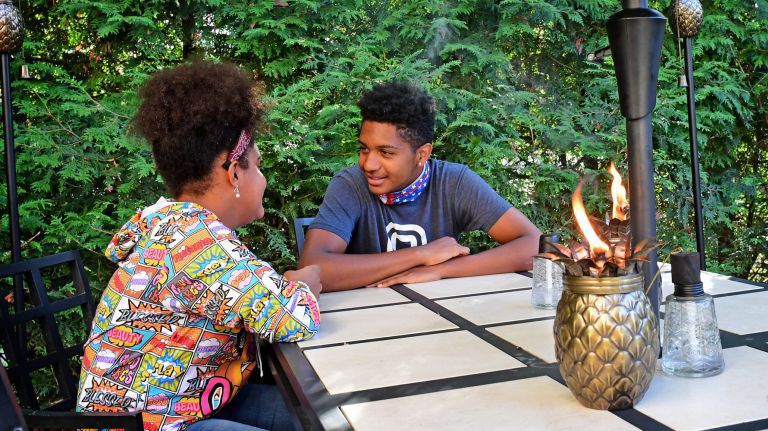By Beth Whitehouse, Newsday, September 18, 2020
Photo: Olivia, 11, and Samuel Murad, 15, were both anxious and excited about returning to school. Credit: Newsday/Thomas A. Ferrara
Olivia Murad, 11, was anxious about more than just entering a new school with new teachers and new classes ahead of her first day of middle school in Great Neck. This year, she also has to deal with concern of the coronavirus.
“She’s a little nervous; wants to know if she’s going to be safe,” says Olivia’s mom, Ianthe, 46, a clinical audiologist. Murad and her husband, Rachid, 48, who works in human rights at the United Nations, have decided it’s important to send Olivia back to the classroom alternate days according to the district’s hybrid plan. “We really have been attached at the hip since lockdown in early March,” Murad says of herself and her daughter. “I feel that the social component is so critical at this age.”
So does Olivia. “When I heard we had to do online school, I had no motivation to get up in the morning and do my work,” she says. “My motivation is seeing my friends.”
Samuel, 15, who is in 10th grade at a private school, is attending five days a week. “I’m very happy about that,” Samuel says. “Getting back to a normal schedule, waking up really early, going to class.” He jokes that he should have readjusted within the first two months.
Like other parents, the Murads are hoping their children adapt easily and any anxiety fades away. “This is a major moment. They’re going to school during a pandemic, which has upended everybody’s world and is pretty scary,” says Karen Fleiss, psychologist and clinical director of the NYU Langone Child Study Center’s Long Island office in Lake Success. Fleiss and other experts offer these 10 ways to help the fall be happier for tweens and teens:
1. Understand and validate
Parents should validate their teen’s feelings to help them process emotions instead of internalizing them, says Elissa Smilowitz, director of triage and emergency services for the North Shore Child and Family Guidance Center in Roslyn Heights.
Mark Lashley, a pediatrician at Valley Stream Pediatrics, part of Long Island’s Allied Physicians Group, likens the pandemic to a rock thrown into a pond creating ripples. “Covid has added a layer of complexity to these worries kids have and the stress they feel,” he says. Separation by six feet may hinder their typical manner of socializing. “They’re worried about the joyful activities they were expecting to have and whether they’re going to have them.”
Parents can be an outlet. “Sometimes teenagers are just looking for people to hear them,” says Pia Alexander, a family therapist in private practice in Brooklyn and Mineola who has two teenagers.
2. Be flexible
“Because things are changing so much moment to moment, it requires a lot of flexibility,” Alexander says. Not just from the kids. “When things don’t look the way you were expecting, it’s about how you respond to those differences.”
Do what’s right for your family and your children, Alexander advises. “Instead of comparing your own family to what other families are doing on social media, families have to define what is special to their own family,” she says. “People are curating these images to put out a story they want to represent them instead of what is really going on.” Eschew the “shoulds,” she says. “Families are going through different experiences.”
3. Try to foster excitement
“There’s an undercurrent of disappointment in what school is actually going to be like this year. They know what it was like in the spring, and they didn’t love it,” Fleiss says. “The energy of the new school year, all the newness of it, it’s just not there.”
Fleiss has one client, she says, who asked her mom if she could change her room around to make it different and a fresh start for the school year; parents can try to help students find ways to feel more engaged.
4. Accept your child’s weaknesses
Accepting their vulnerabilities can reduce family stress. Kids may be worried whether their friend groups will still accept them after having been apart, Smilowitz says. “The worry is, ‘Are they going to talk to me?’” They may have fears about their academic performance.
“Your kid might not be able to achieve everything they would in a typical year,” warns Caroline Mendel, a private practice psychologist from the North Shore. Adjusting expectations will make everyone happier, she says.
Acknowledge that this is hard. “When you see them off task, remind them that you’re with them and they can do it,” says Don Sinkfeld, a mental health practice owner in Valley Stream who has a 13-year-old daughter. Adolescents don’t relish hearing a parent say, “Didn’t you get the instructions about how to turn this assignment in?” “If the kids feel like they’re going to disappoint you, they’re not talking,” Sinkfeld says.
5. Impose daily structure
“Children don’t have the best, what we call in pediatrics, ‘executive functioning.’ They need guidance,” Lashley says. “Providing structure is very important — time for work, time for play, time for bed, time for exercise.”
That routine may look different from a year ago, but a predictable routine is grounding, Mendel agrees. Parents may need to help children break academic tasks down into manageable steps, she says.
Try to limit electronics, Lashley adds. “We lump all electronic devices — TV, tablet, phone and gaming consoles — into one category,” he says. During the summer, experts told parents they could relax the normal advice to keep children entertained in isolation. But now, parents ought to resume some restrictions, Lashley says. The American Academy of Pediatrics guidelines recommends teens have no more than two hours of recreational screen use per day, he says.
6. Allow teens some autonomy
“They’re in this stage where they need to start making decisions,” Fleiss says. Come up with your non-negotiables, what are absolute musts for you, and then allow some choice and ownership on other decisions, experts say.
“Instead of imposing boundaries, you want to discuss it with them, especially with older teens,” Alexander agrees. Say, for instance, “In our family, we all try to get to sleep at this time. Does that feel reasonable to you? What do you propose?”
7. Try to offer socialization outside of school, albeit safely
“Any therapist who works with teens knows that the social setting — their peers, their friends — is the most important thing for them,” says Kathy Sionit, a social worker in private practice in Great Neck who has five children between 11 and 17.
Schools that are totally remote or keeping children six feet apart may not truly offer satisfying socialization, Alexander says. “Parents should, as much as they can, and by what is safe for their family based on medical issues, try to tailor some social interaction for their tweens and teens with others.”
8. Embrace nature
A positive during the pandemic has been the amount of time tweens and teens may be spending outside, Sionit says. Other experts echoed her. “Getting outside into nature is very helpful for children who are having trouble adjusting,” Lashley says.
9. Have a sense of humor
Tweens and teens are trying their best, Sinkfeld says. When things go wrong, try to laugh. “Have a sense of humor about it.”
10. Watch for depression/anxiety
Some teens may experience depression, anxiety, hopelessness, apathy, loss of motivation, even suicidal ideation, experts say. Parents should watch for changes in sleep patterns and appetite, increased irritability or sadness, and decreased ability to concentrate, Lashley says.
It may be a temporary adjustment disorder, Sinkfeld says. “Adjustment disorder means the person is experiencing some kind of life event that they are having trouble adjusting to. COVID changes to school and household routine, even how you learn, that is definitely a huge adjustment,” Sinkfeld says. If parents are seeing signs, they should consider reaching out to a professional for help, experts say.
















